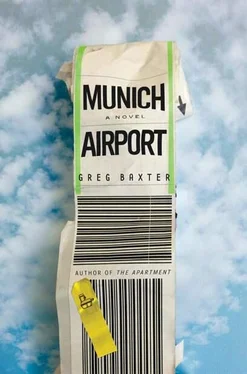Munich Airport is a blue airport, there is blue everywhere. The blue is a serious and efficient blue but also an ebullient blue, full of promise and optimism and reassurance, a blue that says, Everything will be on time, society is safe, planes become faster and faster and also burn cleaner and cleaner, our floors are bacteria-free, the sandwiches are fresh, only beautiful people fly, all destinations are beautiful, everybody is getting wealthier and taller, we are conquering our weaknesses, soon we will all travel to space together. The blue is numinous, full of depth, somehow both spiritual and electromagnetic. And it is contained by a sober gray that you almost do not notice, a gray that says, The blue is where you want to go, but I am how you will get there. It is a gray that does not change shades and that has no depth. I begin to see, through the dissipating thickness of fog and haze outside the window, that it is going to be a clear and marvelous, if frigid, day. It’s a shame there isn’t a way to get outside for a few minutes. It’s a shame there isn’t something like a prison yard, surrounded by high fences and barbed wire, guard towers, whatever it takes, in which travelers could be free to walk in circles, breathe the air, and get sun on their faces.
The nausea from hunger finally becomes acute pain in my stomach. I feel dulled and dizzy and sick. I stop and bend over, with my hands on my hips, and Trish and my father stop and wait. I must be sweating. I sense that I’ve begun to stink a little. You look green, says Trish. It’ll pass, I say. I mean really green, she says.
I realize that this is my opportunity to get away from them. I am not annoyed with them, I am merely exhausted, and want some solitude. I’ve got to go to the bathroom, I say.
We’ll wait here for you, she says.
No, go and try to find some seats, I’ll text you and find you when I’m out.
My father says nothing, but he takes his saggy leather carry-on from me. Trish immediately takes it from him and throws it over her shoulder.
Okay, says Trish to me, we’ll see if we can find something.
They are a hard-to-miss pair in a German airport, but in no time they are swallowed up by the crowds, and I lose them. I’ve grown so accustomed to the nausea caused by hunger that I no longer instinctively want to eat, or feel I should eat. I have learned, over the last few days, that if you can withstand the wave of pain that hunger causes, the nausea itself becomes a sort of nourishment, and the longer I can withstand the wave — especially if I can keep from getting sick — the more enriched I feel. During our second week here, we fattened ourselves like swine. We ate pork sausages and Bratkartoffeln and drank wheat beer for breakfast. In our car, as we drove around from old towns to forts to old cathedrals, we ate cakes and Danishes and ice cream, and played silly songs on the radio and talked with our mouths full. I bopped the steering wheel along to the music. My father splurged on a comfortable midsize Toyota Camry with automatic transmission. It was black. I kept saying, apropos of nothing, This is one sweet ride, or, I love to drive. Once I threw the keys at a hotel bellhop, then shot him with my finger, like a cowboy. We ate pizza slices and cheeseburgers along the motorway. But now, here, in the airport, I realize that I am not going to be able to withstand the nausea and I need to throw up. I am perspiring now, all over, and I have stomach cramps, and I’ve gone very weak and hollow. I get my carry-on and roll it toward the bathroom. My father, smartly, packed his gigantic coat into his check-in luggage, but I didn’t notice this at the time or perhaps I thought my coat might come in useful, or maybe I was still just really cold, but now I have to wear it or carry it. I’m wearing a suit jacket, sweater, and a shirt already. The men’s room has a short line for the stalls, and also a long but swiftly moving line for the urinals. The two lines separate at the door, and every once in a while somebody comes in, bypasses both lines, realizes his mistake, and leaves. The floor of the place is a little wet and the trash of toilet paper and paper toilet-seat covers is strewn around a bit. It isn’t hideous or unexpected, but my nausea makes it difficult to bear. There is also the quake, the trembling hands and chattering teeth that flow out of a disagreeable emptiness that is nearly, I don’t know, not quite in your gut, but in your hips, and also your teeth and ears and feet. And the headache that stabs at the eyes and makes the top of your head tingle and prick, and that ibuprofen can do nothing about. I close my eyes. I try to concentrate on something that pleases me. A single memory of comfort and pacification.
The line for the urinals moves swiftly, but the line for the stalls is stagnant. There is a bushy-haired man in a pin-striped suit who has just filled a newly empty spot at the urinal. I look at him for a long time, and I do not know why I look at him, until I realize that I recognize him, I know him. His name is Richard and he is, or was, the VP of marketing at one of the big banks. I know him because his wife was a friend of my ex-wife’s. He’s a tall, handsome man whom I remember always smiling and always a little tipsy. Though we always got along fine, I don’t think we ever liked each other enough to be friends independent of everybody else. His suit is tailored. I have a suit a lot like his suit, a similar shade of blue. And I wear it with shoes that are nearly the same as his shoes, a light saddle-brown. I recognize him because of his hair and because of his height and the fact that one of his shoulders is slightly sloped. I am standing by the sinks. He finishes, zips up, turns around, and sees me. I smile and he gives me an uncomfortable smile back. He doesn’t recognize me. The men along the wall of urinals, all of them, finish all at once, and everybody, including Richard, walks to the sinks, which sends them right through us, the line for the stalls, osmotically. As Richard washes his hands, I sense that he’s looking at me through the mirrors. He dries his hands. He takes a while, and I know now that he has, at last, recognized me, and has to decide whether he will stop and say hello. Perhaps I don’t look well enough. He passes. He goes right by, and he does not slow down or lift his head. The time that elapses after that, between his departure and my turn in one of the stalls, is a kind of infinity, and when I shut the door behind me and am finally ready to throw up, I feel, surprisingly, fine. The nausea is gone. I do not sit. I just stand and close my eyes and put my forehead against the door. I cannot imagine the fatigue Miriam must have experienced, without any bodyweight to burn. It makes, of course, perfect sense that her apartment was, by the end, such a mess, so untidy. Over the past few days, I have thought often of the stillness that must have inhabited that apartment at times, when she was very tired and lying in bed. I presume, or at least I hope, that the nausea and the headaches and everything else are something your body absorbs after weeks or months or years of malnutrition, and that the hunger, especially at the very end, the last days, didn’t cause her a huge amount of pain, and didn’t add any more madness to the madness that allowed her to decide to die from this.
The place where we stayed during our first week in Berlin — the week before we briefly upgraded to a private apartment, then got a rental car and drove to the Rhineland — was a grubby little hotel that had, in each room, a tiny single bed pressed up against one corner. I didn’t fit on mine, and so my father, who is the same height as me, could not have fit on his. On each bed was a thin duvet that was half as narrow as the mattress, and made you sleep completely straight, like a plank, as well as a thin pillow that I had to fold up many times. Sleep was stressful and unrefreshing. There was an orange chair in my room and a yellow chair in my father’s room. They were tulip chairs. Beside the chairs were little round tables. The bathrooms were green, entirely green, from the sinks to the tubs to the toilets to the towels to the toilet paper. The walls of the room were brown, the brown of fresh, strong coffee. The rooms had light, white, cloth curtains for privacy during the day, and at night, to shut out light, you pulled down metal shutters. I did this the first night without thinking and had an anxiety attack when I woke in the middle of the night in pure darkness. I rolled around the room like a lunatic for a while, giving off silent screams, grabbing the walls, knocking everything over, crawling around the floor, until I found the door, opened it, and threw half my body into the dimly illuminated corridor, and lay there until my breathing went back to normal. I have a real sense that this darkness, and this panic, is what my death will be like, except I will never reach the door and find the corridor. I’d forgotten all about these attacks. I used to have them often, at night, in hotel rooms at conferences, when I’d drink a little bit too much, close the curtains out of habit, and pass out instead of properly falling asleep. I can easily fall asleep in darkness, but I always wake, always from recurring nightmares, and if I wake and find myself in total darkness, if my eyes cannot adjust to explain why I am not in my bed — always, for a moment, I forget where I am — I suffer an acute anxiety attack and usually end up falling over furniture in an attempt to escape wherever it is I think I am, or simply to agonize over my blindness. The rooms didn’t have key cards. We had keys that were attached to metal blocks inscribed with our room numbers, and we left them at reception if we went out. Two people rotated at reception — a woman, probably in her fifties, orange hair, very tanned, voluptuous, freckled cleavage, with a stern and humorless gaze, who manned the desk in a mean and unforgiving way during the day, and an Arab man with thick eyebrows, small shoulders, and powerful but dwarfish arms who answered the hotel door if we happened to come home after eleven p.m., when it was locked. We spoke to him on a few occasions, because we feared him less than we feared the woman, and he said he drove a taxi during the day. When do you sleep? my father asked him. When I’m here, he said. It was never a relief to enter my room. I couldn’t sleep well, because of the small duvet, because the mattress was too soft in the middle, and because I had to leave the shutters open, so the bright lamplight outside poured in all night. My father, that first week, couldn’t sleep either, and I heard him every morning, around three-thirty or four, showering and getting dressed, pointlessly flipping through channels on the television.
Читать дальше











